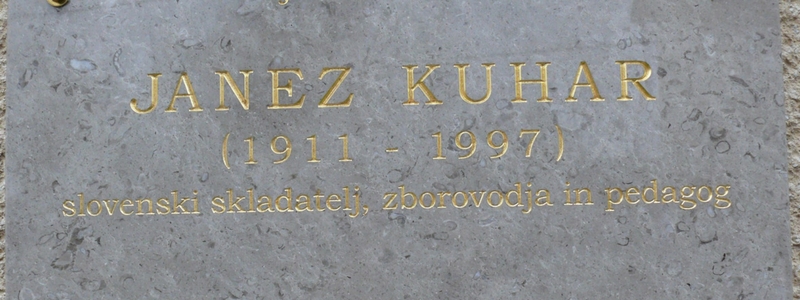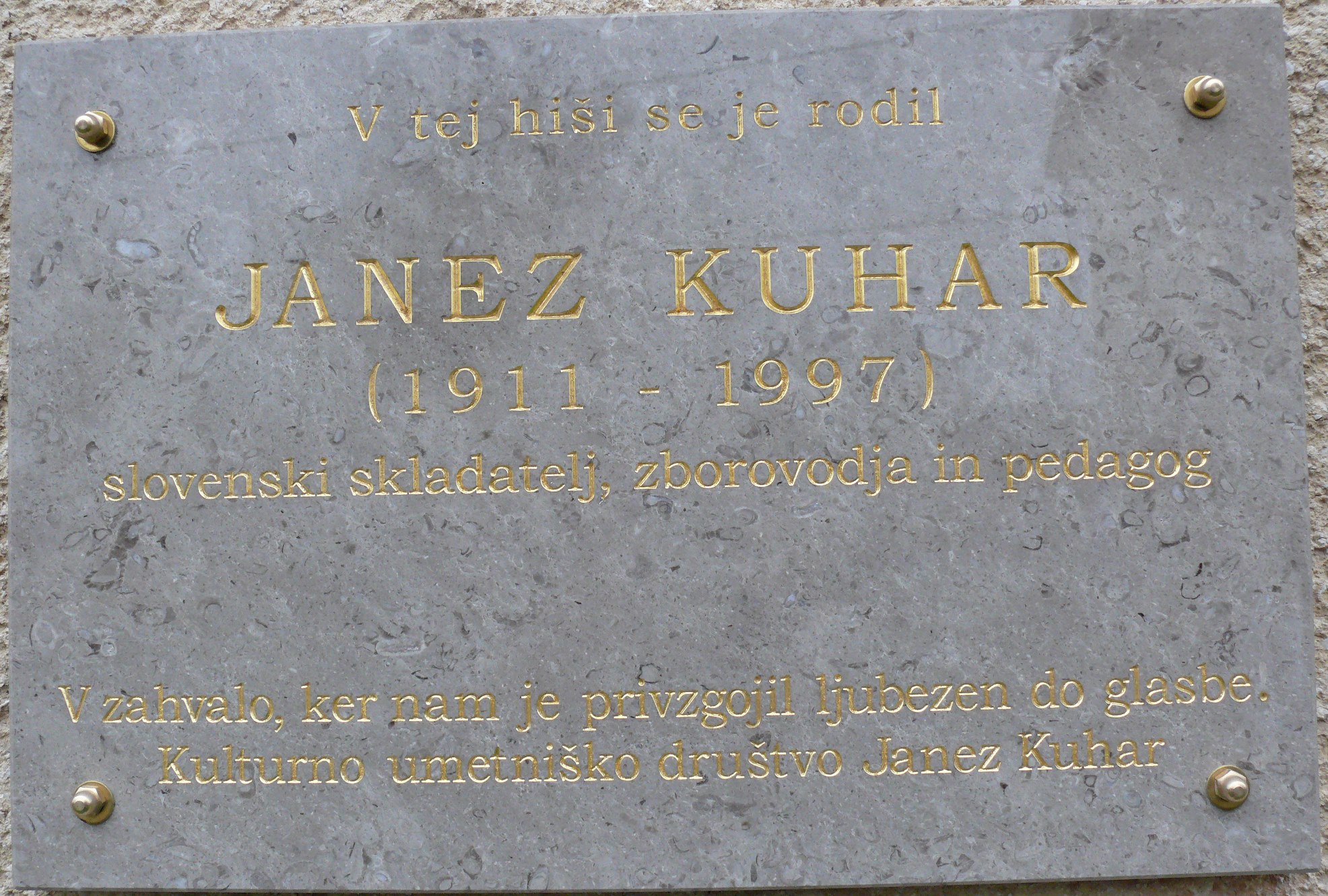In 2012, the Janez Kuhar Cultural and Arts Society commemorated the 101st anniversary of the composer’s birth by attaching a memorial plaque to the facade of his birthplace in Vevče near Ljubljana. Put up on the initiative of Janez Kuhar’s family members, the plaque bears the inscription, “Janez Kuhar (1911–1997), a Slovenian composer, choirmaster and teacher, was born in this house. As a token of our appreciation for fostering our love of music, the Janez Kuhar Cultural and Arts Society.”
Janez Kuhar
The variegated and valuable creative endeavours of musician Janez Kuhar (1911–1997) left a permanent mark on the Slovenian music scene. While achieving distinction as a gifted accordionist, singer, violinist and composer, Kuhar’s most widely manifest influence was that of a choirmaster. His large body of compositions comprises vocal music on patriotic themes, lieder and numerous choral works for children.
It was early on, during his student days, that Kuhar devoted his musical aspirations to the younger generation by studying music teaching, which he completed in Ljubljana. After graduation, he went to Ljutomer to take up his first teaching post. At a school in Šafarsko he established a youth choir and started composing children’s songs. Throughout this period, Kuhar regularly attended rehearsals of a teachers’ choir in Ljubljana, thus keeping contact with the more developed cultural capital.
Kuhar’s teaching was suspended by the war. In 1942, he joined the Dolenjska (Lower Carniola) region partisan forces in the national liberation struggle, led between 1941 and 1945 by the Communist Party of Yugoslavia. During the war, Kuhar emerged as the central partisan musician and established the first partisan male choir in Slovenia. He wrote multi-voice songs and adapted folk tunes for this choir, whose concerts enjoyed enormous popularity, also owing to Kuhar’s unique accompaniment on the accordion, an instrument which he held very dear and which was his main tool in composing choral songs. As an accordionist, he was regularly featured on Liberation Front Radio.
His repute as an accomplished musician was supposedly acknowledged also by Marjan Kozina, with whom Kuhar, along with Dragotin Cvetko, conducted provisional music courses, teaching accordion and choral conducting. During the post-war period, Kuhar extended his accordion solo repertoire by performing works by acclaimed Slavic composers as well as his own compositions.
After WWII, Kuhar again applied himself to music for young people. He was the music teacher at Poljane Grammar School and served as a long-standing conductor of the RTV Slovenia children’s choir. Choral singing became widespread among young people at the time, and was one of the most prevalent extramural activities. Together with Janez Bitenc, youth music editor at Radio Ljubljana, Kuhar succeeded in broadening the repertoire for young audiences by inviting contributions from diverse composers and writers, to cite one initiative. Furthermore, their efforts proved instrumental in boosting the development of the choral repertoire. In general, more attention was paid to choral music during their active advocacy of the genre.
Kuhar’s most prominent works comprise the lied Bosa pojdiva, dekle (Let Us Go Barefoot, My Girl) and works that have spread among the people, becoming part of the national folk song repertoire, including the choral adaptations Počiva jezero v tihoti (The Restful, Calm Lake Waters) and Stoji na gori partizan (A Partisan Standing on a Mountain) and the choral composition Jaz imam pa goslice (Well, I Have a Fiddle). His popular pieces include Tam na Pugled gori (There, on Mount Pugled) and the march Jutri gremo v napad (Tomorrow, We Attack), a partisan hit, which was adapted in various versions and held broad appeal for decades after the war.
One of Kuhar’s special talents was his ability to become intimately involved in the minds of children, a world that he was so adept at translating into his music. Putting this talent to good use, he fostered the appreciation of music in the first generation of the Children’s and Youth Radio Choir and thus accomplished an outstanding singing and educational feat, a truly pioneering accomplishment for the subsequent development of choral singing in Slovenia.
Maia Juvanc

